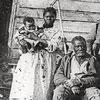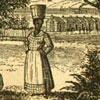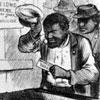While the Freedmen’s Bureau helped to provide access to education and social services, addressing issues of labor and landownership proved difficult. The system of sharecropping developed across the South to replace the labor provided by slaves. Consider the terms laid out in this sharecropping contract written by a North Carolina planter in 1882. Whom does the agreement favor? What possibilities and constraints does it impose upon sharecroppers?
Sharecrop Contract, North Carolina, 1882
To every one applying to rent land upon shares, the following conditions must be read, and agreed to. To every 30 and 35 acres, I agree to furnish the team, plow, and farming implements, except cotton planters, and I do not agree to furnish a cart to every cropper. The croppers are to have half of the cotton, corn, and fodder (and peas and pumpkins and potatoes if any are planted) if the following conditions are complied with, but-if not-they are to have only two-fifths (2/5). Croppers are to have no part or interest in the cotton seed raised from the crop planted and worked by them. No vine crops of any description, that is, no watermelons, muskmelons, . . . squashes or anything of that kind, except peas and pumpkins, and potatoes, are to be planted in the cotton or corn. All must work under my direction. All plantation work to be done by the croppers. My part of the crop to be housed by them, and the fodder and oats to be hauled and put in the house. All the cotton must be topped about 1st August. If any cropper fails from any cause to save all the fodder from his crop, I am to have enough fodder to make it equal to one-half of the whole if the whole amount of fodder had been saved.
For every mule or horse furnished by me there must be 1000 good sized rails. . . hauled, and the fence repaired as far as they will go, the fence to be torn down and put up from the bottom if I so direct. All croppers to haul rails and work on fence whenever I may order. Rails to be split when I may say. Each cropper to clean out every ditch in his crop, and where a ditch runs between two croppers, the cleaning out of that ditch is to be divided equally between them. Every ditch bank in the crop must be shrubbed down and cleaned off before the crop is planted and must be cut down every time the land is worked with his hoe and when the crop is “laid by,” the ditch banks must be left clean of bushes, weeds, and seeds. The cleaning out of all ditches must be done by the first of October. The rails must be split and the fence repaired before corn is planted.
Each cropper must keep in good repair all bridges in his crop or over ditches that he has to clean out and when a bridge needs repairing that is outside of all their crops, then any one that I call on must repair it.
Fence jams to be done as ditch banks. If any cotton is planted on the land outside of the plantation fence, I am to have three-fourths of all the cotton made in those patches, that is to say, no cotton must be planted by croppers in their home patches.
All croppers must clean out stable and fill them with straw, and haul straw in front of stable whenever I direct. All the cotton must be manured, and enough fertilizer must be brought to manure each crop highly, the croppers to pay for one-half of all manure bought, the quantity to be purchased for each crop must be left to me.
No cropper is to work off the plantation when there is any work to be done on the land he has rented, or when his work is needed by me or other croppers. Trees to be cut down on Orchard, house field, & Evanson fences, leaving such as I may designate.
Road field is to be planted from the very edge of the ditch to the fence, and all the land to be planted close up to the ditches and fences. No stock of any kind belonging to croppers to run in the plantation after crops are gathered.
If the fence should be blown down, or if trees should fall on the fence outside of the land planted by any of the croppers, any one or all that I may call upon must put it up and repair it.
Every cropper must feed or have fed, the team he works, Saturday nights, Sundays, and every morning before going to work, beginning to feed his team (morning, noon, and night every day in the week) on the day he rents and feeding it to including the 31st day of December. If any cropper shall from any cause fail to repair his fence as far as 1000 rails will go, or shall fail to clean out any part of his ditches, or shall fail to leave his ditch banks, any part of them, well shrubbed and clean when his crop is laid by, or shall fail to clean out stables, fill them up and haul straw in front of them whenever he is told, he shall have only two-fifths (2/5) of the cotton, corn, fodder, peas, and pumpkins made on the land he cultivates.
If any cropper shall fail to feed his team Saturday nights, all day Sunday and all the rest of the week, morning/noon, and night, for every time he so fails he must pay me five cents.
No corn or cotton stalks must be burned, but must be cut down, cut up and plowed in. Nothing must be burned off the land except when it is impossible to plow it in.
Every cropper must be responsible for all gear and farming implements placed in his hands, and if not returned must be paid for unless it is worn out by use.
Croppers must sow & plow in oats and haul them to the crib, but must have no part of them. Nothing to be sold from their crops, nor fodder nor corn to be carried out of the fields until my rent is all paid, and all amounts they owe me and for which I am responsible are paid in full.
I am to gin & pack all the cotton and charge every cropper an eighteenth of his part, the cropper to furnish his part of the bagging, ties, & twine.
The sale of every cropper’s part of the cotton to be made by me when and where I choose to sell, and after deducting all they owe me and all sums that I may be responsible for on their accounts, to pay them their half of the net proceeds. Work of every description, particularly the work on fences and ditches, to be done to my satisfaction, and must be done over until I am satisfied that it is done as it should be.
No wood to burn, nor light wood, nor poles, nor timber for boards, nor wood for any purpose whatever must be gotten above the house occupied by Henry Beasley-nor must any trees be cut down nor any wood used for any purpose, except for firewood, without my permission.
Sharecropping initially seemed to be a middle ground between the desire of whites to control the labor force and the desire of African Americans for independence and land. Under sharecropping contracts, black families rented land to farm on their own. This arrangement heavily favored the white landowners, however, especially as the world cotton market took a downward turn.
At the end of the year, families often found themselves in debt to the landowner for supplies, equipment, and additional needs, such as medical services. The reality of sharecropping for most families meant being tied to the same land they had worked as slaves. They were frequently forbidden to leave until they settled their debt with the landowner, almost impossible under the terms of sharecropping.
Sharecropping remained the dominant labor system in the South well into the 20th century.
Source: “A Sharecrop Contract,” 1882, Original in Grimes Family Papers Folder 388 Volume 58: 1882-1883 (Scan 28). Held in the Southern Historical Collection University of North Carolina, Chapel Hill.












